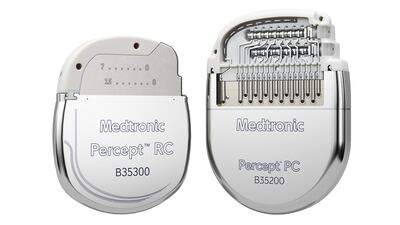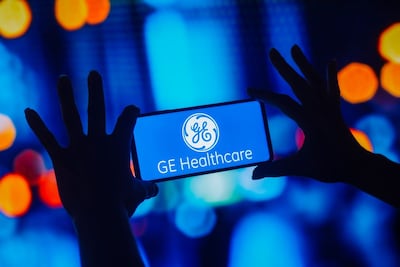
Diagnostic Imaging

In this week’s Digital Health Roundup, Medtech Insight’s Marion Webb talks about her interview with GE HealthCare’s chief AI officer Parminder Bhatia about his vision for AI in health care and other highlights from HLTH. Natasha Barrow discusses her interview with Owkin on the EU AI Act and highlights Click Therapeutics’ latest clinical results.

AdvaMed is calling on Medicare to provide coverage for supplemental screenings for women with dense breasts, an anatomical characteristic that puts them at a higher risk for cancer. The trade group says the lack of coverage for additional imaging results in many women not receiving potentially lifesaving follow-up.
Medtech Insight talked with GE HealthCare’s chief AI officer Parminder “Parry” Bhatia at HLTH about the firm’s new CareIntellect for Oncology offering to help clinicians make efficient use of multimodal patient data, his vision for projects within AI Innovation Lab, and the future of AI in health care.

Medtech Insight was on the ground at HLTH looking for innovative companies. Learn about seven start-ups using AI to help physicians detect conditions including prostate and breast cancers, seizures and heart failure; assess patients for cognitive decline validate and deploy algorithms, and monitor patients in and out of the hospital.

This week, Medtronic and Hologic announced major safety issues; the US government awarded $110m to innovators in women’s health; CDC partnered with Quest on a bird flu diagnostic; and more.

Medtech Insight spoke with Vicky Demas, CEO of Identifeye, about plans for bringing the company’s AI-powered retinal screening system for early detection of diabetic retinopathy to primary care facilities. More than 50% of the roughly 38 million Americans who have diabetes skip retinal screenings at present, increasing risk of developing the leading cause of blindness in adults.

Start-ups pitched a diverse deck of innovative technologies to three judges and an audience of potential investors, strategics and physicians at the Octane Medical Innovation Forum in Irvine, CA. Highlights include neuromodulation company Sinaptica Therapeutics, which won the competition for both “People’s Choice” and “Judge’s Choice.”

This week, Establishment Labs Holdings announced the FDA gave it premarket approval for Motiva breast implant, Cologuard lands FDA approval for Cologuard Plus and GE HealthCare gets FDA nod for a new imaging agent. The FDA announces another expansion for TAP into ophthalmology and radiology. The AAMI and CTA will join forces to develop standards for AI and ML-enabled health care products.

The US FDA has published final guidance to provide clarification for industry and agency staff on federal regulations of diagnostic X-ray equipment.

This week, Neuralink announced it received US FDA breakthrough device designation for a device to restore sight; medtechs Discure and DeepLook secured new funding; FDA pump recalls from B. Braun Medical and Fresenius Kabi; Axonics prevails in patent infringement lawsuit with Medtronic; Merit Medical buys Cook Medical for $210m.

The US FDA now requires mammograms include information about breast density, a significant factor that raises breast cancer risk and can hide tumors.

Sonio says its acquisition by global medical equipment company Samsung Medison is a wrap. Plans for the deal were announced earlier this year.

This week, a medical group sued the FDA to block a lab-developed test rule; the FDA published guidance on device classifications; Defibtec issued a recall of its chest compression device and ICU Medical updated instructions for its infusion pump batteries; Maui Imaging raised a $4m DOD grant to put imaging tech into military-based trauma units.

Medtronic receives US FDA approval for deep brain stimulation surgery for people with Parkinson’s and essential tremors while the patient is under general anesthesia, making it the first and only company to offer DBS surgery while the patient is asleep.

This week, the US FDA sent a warning letter to maker of batteries for AEDs, AMCO; Virtual Incision successfully completed the first hysterectomy its miniaturized robotic-assisted surgery device MIRA; The DOJ finalized a rule that requires government-operated health care facilities to provide accessible equipment for people with disabilities; the FDA compiled its resources on reprocessed medical devices onto a new web page; and more.

GE HealthCare announced it will team up with AWS to build new generative AI models and applications that can help doctors find key patient information faster and help with diagnosing and treating patients.

This week, Nipro Medical Corp. announced it will invest $397.8m to build a US-based production plant, generating 232 new jobs; both Baxter and Hamilton announced ventilator recalls; Imperative Care wins FDA clearance for its stroke catheter; Intelligent Ultrasound Group plc entered into a conditional sale and purchase deal to sell its Clinical AI business to GE HealthCare for £40.5m; RMI distributed 350m rapid test kits in the fight against HIV/AIDS; Jiangsu Shenli Medical Production Co., Ltd received a second FDA warning letter about quality and safety of plastic syringes.

AI is all the rage these days, so it comes as no surprise that the topic of AI technologies ranked high during the panel discussions at the HLTH Europe event, held from 17-20 June in Amsterdam.

The pathway, which would be separate from breakthrough device reimbursement, would allow new AI technology to be reimbursed based on “clinical value and public stakeholder engagement.”

Medtech Insight talked to two leaders at the Alzheimer’s Drug Discovery Foundation about current therapies and the role of biomarkers and digital tools to build on recent advancements in the space and accelerate progress to identify the disease early and slow cognitive decline.